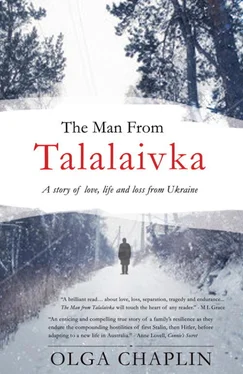Chapter 43
The setting sun was playing a game of hide and seek between crevice and mountain top as the train laboured its way uphill and westward. Soon, streaks of softest pinks and deepening cerise splashed across cumulus and stratus clouds, transforming them to floating silken capes ready to shroud the blue-tinged valleys of the Great Dividing Range. Peter shook his head, amazed at the vastness of seemingly endless trees and rocky crags, and in wonderment at the changing spectacle of colour before him as the train paused to grip the railway tracks at yet another incline. “But where could this migrants’ camp be—so far in this wilderness?” he wondered. “Surely no settlement could survive here, among this bush and rock.”
“Cuppa tea, sir?” A waitress pushed her trolley before her and deftly poured the pungent brew into metal mugs for Peter and Evdokia. She frowned as she noticed their limp child in his arms, glanced at Evdokia’s distressed face. “She not well, sir?” she queried. Peter sensed her concern and shook his head. The waitress pursed her lips for a moment, then braked the trolley. She seemed to grow in stature as she pulled out a small notebook and pencil from her uniform pocket and recorded the carriage and cubicle numbers.
“My name is Doreen,” she said, pointing at her chest. “What is your name, sir?” Peter comprehended this, and gave her his name. The waitress’s large frame stood even firmer. “Peter, you say… hmm, that will do,” she recorded it, dismissing the surname.
“You take this tea, sir—your little girl needs to drink.” She handed him one full mug after another, then doled out spoonfuls of sugar from her tin canister before moving to the remaining cubicles of the carriage. Within minutes she returned, her face flushed.
“Come with me, sir,” she smiled, pointing to Peter, then to herself and the end of the carriage. He gauged this woman was attempting to help them. He quickly folded his jacket into a pillow and laid Ola on the seat.
“Dyna, perhaps we may be fortunate—there may even be a doctor on this train.” He squeezed Evdokia’s hand, observing her relief, and smiled at Mykola and Nadia, who remained quiet and wide-eyed. “And surely this journey will end soon.”
He followed the buxom waitress through several more carriages, but hesitated as she pointed to the guard’s door. “Go on in, sir… he should be able to do something for your little girl.”
Peter stepped into the guard’s carriage. Still wary, he noted its tidiness, the labelled parcels and other items secured by a rope on one side. On the far side was a stack of newspapers, tightly tied, ready for distribution. An accompanying headline placard rested against the stack. He could just make out the words: ‘Stalin Agent…’ The guard rose slowly, as if preoccupied. He brushed at non-existent crumbs as he turned to Peter. His desk was devoid of paraphernalia: a sturdy metal mug of the dark brew, and that day’s newspaper, The Sydney Morning Herald , Thursday 2nd March, 1950, was spread out across it. The guard looked at its headline, then at Peter, then back to the newspaper. His eyebrows furrowed as he surveyed Peter for a few moments.
“You a German, mister? You a Kraut?” he blurted out, unable to control himself. “You speak Deutsch?”
Peter sensed that this Australian guard was querying his origins. He quickly glanced at the guard’s hat hanging on a hook near his desk and breathed a sigh of relief. The man’s uniform was a simple shirt and dark trousers and jacket, unlike the military uniforms of police or militia who had dominated their lives in Europe. He glanced again at the newspaper, as the guard continued to eye him.
“You read English, mister?” He was curious now. He had not yet met any of these newly-arrived displaced persons, and none had ever stepped into his private space until now. “You see what they’ve uncovered in the Old Bailey?” He picked up the newspaper and, raising his voice, read with authority: “‘Atom spy gets fourteen years. Fuchs pleads Guilty’.” He misunderstood Peter’s querying look and continued. “Here… listen to this: ‘Doctor Klaus Fuchs, a top British atom scientist, was sentenced to fourteen years imprisonment today after he pleaded guilty to having divulged atomic research secrets to Russian agents.’ This man was German… this Doctor Klaus Fuchs… and the British government trusted him, and gave him a home, and protection!” He slapped his hand on the newspaper’s photograph of the sentenced scientist as if he were swatting a renegade fly. Peter blinked, surprised at the man’s vehemence. Then he remembered he had heard the words ‘Russian agents’ during their Heidenau camp years.
“Stalin? Agente?” Peter queried again. The guard nodded. “Communist?” Peter asked. Lips tight, the guard nodded knowingly.
Peter felt his stomach tighten. The long day with the departure authorities, and their sickly child needing attention, had strained him to the limit. Now he stood before this burly guard, being quizzed as to his origins. He and Evdokia were compatriots of their Ukraine, but Ukraine was a part of the Soviet Union and they had spent six years in Germany, two years of which were under German control. He took a deep breath and stepped back as he tried to summon the courage to ask this guard to help him seek medical help for their Ola.
He swallowed hard, felt somewhat sickened. Stalin’s tentacles had spread all over the modern world, these days. He and his family could not be further from Stalin’s clutches, now, and yet the megalomaniacal dictator was able to penetrate the psyche and security of these English-speaking people living peacefully so far from Europe. Now he felt obliged to defend his beliefs, his family’s good intentions in reaching these far-off shores. Holding back his emotions, hand on chest as he tried to control his twitching lip, he could only reiterate: “Ya ye Ukrainske, ya ye Ukrainske. Ne Deutsch. Ne Stalin.”
The guard stepped towards him, still eyeing him, pausing for a moment, then grasped his shoulder. “It’s all right, mister… it’s all right.” He cleared his throat.
“Moya dochka…” Peter began.
“Your little girl is sick, mister?” He checked his list of passengers, then smiled and shook his head as he realised that neither of them could freely communicate with each other. He scratched his greying hair and, swinging back into his dilapidated leather chair, he pointed to the map on the wall behind his neat desk. “We are here, mister… near Katoomba. But we don’t stop here. We’ll be slowing here, at Lithgow…” his finger traced the Central to Bathurst line on his map. “They’ll be bringing us food, sandwiches—but not stopping, mind you,” he pointed to his mouth. They smiled, their eyes meeting as they communicated in the most basic of ways.
“When we reach Lithgow, I will telephone ahead,” he pointed to his telephone as if he were playing a game of charades. “Bathurst hospital will take good care of your daughter. She must drink this,” he pointed to his black tea. He stood up again and patted Peter on the shoulder, then turned to his log-book, in readiness to telephone the Bathurst authorities.
The night had set black over the mountains and countryside, the carriages barely lit by sporadic wall globes as Peter made his way back to their carriage. He caught his reflection in the blackened window panes, felt dismayed with what it revealed on this, his first night in their new country. His face had that same haggard appearance he had seen reflected on that fateful train journey through Germany’s Black Forest on the way towards their Naples destination.
He stepped soundlessly towards their cubicle, hoping their child may be sleeping. Evdokia looked up, weeping. She had been unable to stop Ola from retching, and now their child was lapsing into unconsciousness.
Читать дальше












